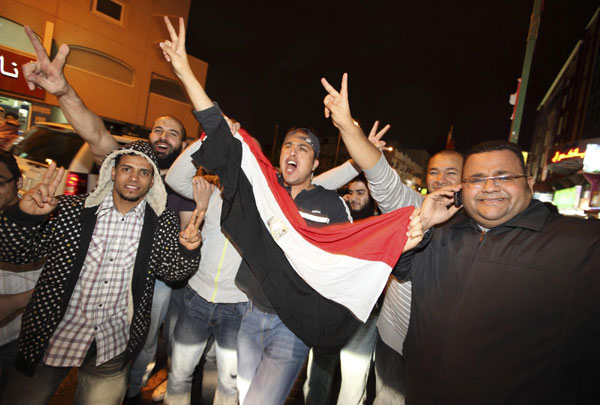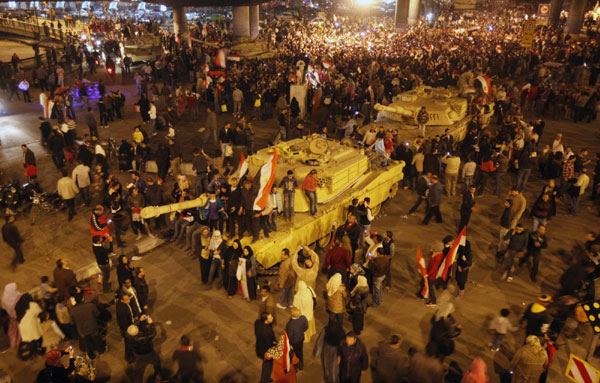Politics
Uncertainty clouds jubilation in Egypt
Updated: 2011-02-12 16:48
(Xinhua)
 |
|
Egyptians residing in Bahrain celebrate the resignation of Egypt's President Hosni Mubarak, in Manama Feb 11, 2011. [Photo/Agencies] |
CAIRO - Hosni Mubarak, the man who held onto power for nearly 30 years in Egypt, ended his presidency and handed power to the army Friday, after 18 days of uninterrupted anti-government protests.
The announcement was made by Vice President Omar Suleiman, who said a military council would run the country of 80 million for now.
Military council takes over
The Egyptian Supreme Council of Armed Forces, consisting of the military's top generals and headed by Defense Minister Field Marshal Hussein Tantawi, 75, said the army would not act as a substitute for a legitimate administration based on the "legitimacy of the people."
|
||||
"We realized the seriousness of the current situation, we are studying all the necessary procedures and steps to achieve people's demands and we will declare a statement of the proposed plans," the spokesman said.
According to Al Arabiya television, the army would soon dismiss the cabinet and suspend parliament. But, so far, the council has given few details of what it says will be a "transitional phase" and no timetable for presidential or parliamentary elections.
Since the protests started, the position of the armed forces has been crucial and, according to some analysts, a rift between the civilian and military leadership had appeared before Mubarak's departure.
On Thursday, following Mubarak's surprising announcement that he would not resign and instead delegate some of his power to his vice president,the military council issued a statement saying it "decided to remain in continuous session to consider what procedures and measures that may be taken to protect the nation and aspirations of Egyptian people."
Nabil Abdel Fatah, a political expert in the Al Ahram Strategic Studies Center told Xinhua: "The public doesn't trust Omar Suleiman anymore. As Mubarak said he would delegate power to his deputy according to the constitution, that meant Suleiman couldn't take any decision without consulting the president. There would have been a kind of manipulation."
Mubarak's departure was celebrated by protestors in Tahrir Square, the epicenter of the protests, and practically all across the country, where people danced and sang, fireworks went off and cars honked. But behind the celebrations, there was a note of caution over how the transition would unfold and what direction it would take.
"I am glad to hear that the president steps down," said a protestor. "But I am not sure what the county's future will be after the military takes over power."
Some question the army's appetite and capacity for democracy. When the euphoria subsides, it will remain to be seen how the army will restore order and conduct the transition of power in a country where more than 50 percent of the adult population is illiterate and some 40 percent live below or close to the poverty line.
Obviously, any future government will face huge social and economic problems, among them a vast gap between the haves and the have-nots and rising food prices, one of the reasons that drove the protesters to the streets.
 |
|
Egyptians celebrate Egyptian President Hosni Mubarak's resignation near army tanks in Cairo's Tahrir Square Feb 11, 2011. [Photo/Agencies] |
Opposition in talks
Now that Mubarak is gone, the hard work starts, experts say and it remains unknown who will fill the void.
Under Mubarak's rule, Egypt's opposition had very limited power and rather loose organizations. The Egyptian opposition had no hand in empowering the protests, and tens of thousands of protestors, many of whom belong to the so-called post-80s generation, were actually leaderless.
The Muslim Brotherhood, the largest and most organized opposition group in the country, which had kept a low profile during the massive nationwide rallies, has so far spelled out no clear vision for the country. There are divisions inside the group on what shape an Islamic state would take.
And the group is backed by only about 15 percent to 20 percent of the population.
As Mubarak is gone, the fate of the ruling National Democratic Party (NDP) also becomes unclear, but most people expect it will be dissolved. The newly appointed head, Hossam Badrawy, resigned a few minutes before Suleiman's announcement of Mubarak's resignation.
Experts say it will take time to ensure that free and fair elections can occur and that candidates can emerge.
After the announcement of Murarak's departure, leading Egyptian opposition figure and former International Atomic Energy Agency chief Mohamed ElBaradei hailed the Egyptian people on Arabic satellite channel Al-Jazeera, saying: "My message to the Egyptian people is that you have gained your liberty".
But according to Al Arabia TV, ElBaradei doesn't intend to run for president.
Some expect that Arab League chief Amr Moussa could emerge as a leader in his native Egypt.
Moussa said he would resign from the position as Arab League chief within weeks because he has new plans, but he denied he would run for president in Egypt, saying "as an Egyptian, I have the honor to serve my country in any post and it is time to help in forming a consensus of opinions."
E-paper

Ear We Go
China and the world set to embrace the merciful, peaceful year of rabbit
Preview of the coming issue
Carrefour finds the going tough in China
Maid to Order
Specials

Mysteries written in blood
Historical records and Caucasian features of locals suggest link with Roman Empire.

Winning Charm
Coastal Yantai banks on little things that matter to grow

New rules to hit property market
The State Council launched a new round of measures to rein in property prices.




